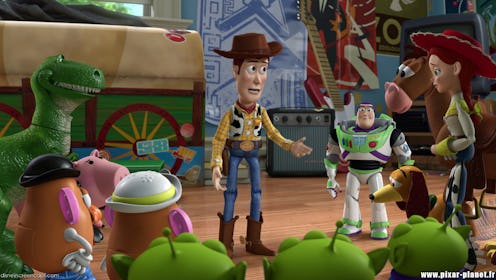Entertainment
'Boyhood' Got Me On Board with 'Toy Story 4'

I, too, was vehemently opposed to the idea of a Toy Story 4 . My reasons were probably similar to yours: fearful insistence that further additions to the trilogy would dilute the perfect ending we saw in the 2010 threequel. Just as any devoted opponent of a fourth Toy Story movie would, I’d profess that this was no ordinary series.
To its generation — the collective that entered Andy’s world as children and bade him valedictions on the dawn of its own adulthood — Toy Story stands as the foremost artistic testament to growing up, allotting some of its young viewers’ their first experiences with the ideas of change and loss, and distributing these ideas over the span of an American childhood. When everything that Toy Story had purveyed — these wholly substantial institutions upon which many Pixar-raised youngsters had founded their definitions of friendship and life — was capped with an impossibly satisfying farewell between Andy and his best friend Woody, it meant a validation of all the values that the films had instilled within us. Sound about right?
So, as did many, I faced the notion of a follow-up to Toy Story 3 as something of a threat. Would a fourth movie undo the goodwill imparted by that final “So long, partner”? Would it retroactively rob us of the solidity associated with the all-important story? From the moment I first heard about the prospect of a Toy Story 4, I trembled over the inevitability of these brands of fate. But I’ve since come to understand that not only would it be shy of disastrous, it might perhaps be altogether necessary for a fourth movie to make its way to theaters. And that realization came thanks, in part, to Boyhood.
My anticipation for the Richard Linklater epic was sky-high; emotional preparations were made to access the greatest take on the coming-of-age genre I’d yet to see. If you’ve seen Boyhood, you know that it is not quite what the coming-of-age genre has readied us for. It is decidedly lacking in epiphany moments, neat summations, or sweeping messages about what it means to be a boy, to be alive. It is, instead, a genuine movie about growing up. It is messy, rambling, and organic.
Best of all, it is provocative of this imperfection as a requisite for ample living. It insists that each and every component of its story, and of a life on its own, is equal the show-stopping scene. All endeavors — camping, graduation, working in a kitchen, reading Harry Potter, walking down the block, watching your stepfather throw a fit, talking, staring, everything and nothing — are of the same import, and met with the same appreciation.
A Toy Story 4, in its unraveling of the proper bow atop the Toy Storys we have to date, wouldn’t be “neat.” It would feel risky, frightening, and extraneous. But these, also, are characteristics of leaving childhood. If we leave off forever with that perfect moment between Andy and Woody, it’s almost as if we’re relegating ourselves to a seizure of time — an eternal preservation of the moment we’d prefer to be living in, which is altogether contradictory to what Toy Story has always been about.
Everybody has his or her personal narrative when it comes to Toy Story. Mine — one riddled with remarkable clichés — began at age seven in a New York City multiplex. My father couriered my older sister, her best friends (the twins from down the block), and me to the theater to watch the movie. The girls broke off to sit independent from us, something I didn’t then quite get. I was happy to enjoy the animated majesty in the company of my father, the benefactor of my pop culture tastes from Groucho Marx to Pinky and the Brain.
In ’99, two years after relocating to the suburbs, my dad and I went solo to Toy Story 2, a then unrealized bookend to our pop culture-founded bond. As my impending adolescence would messenger in the usual set of banal traditions — hostility, depression, halfhearted rebellion against the patron of my love for wordplay and plots to take over the world — and his work-laden 50s would render little time or brainpower toward the effort to combat any of the above, our movie trips together ended with the Pixar sequel.
…And only picked up again in 2010, when — following a graduation from college and a trip overseas that left me aimless, misanthropic, and effectively panphobic — I called up the father to whom I had spoken nary a few words at any singular instance over the point of the last five years, asking if he’d be available to see Toy Story 3. He was just about to call me with the same request, he said.
So, there you are. A perfectly overly sentimental relationship with a movie about just that: the pangs of growing up. We can’t expect to stay young and unscathed forever — an impossibility and a hypothetical shortchanging on the bounties of life — so why should we expect to hold onto that youthful perfection that capped our generation’s coming-of-age epic? A Toy Story 4 might not be as heartrendingly tidy as Toy Story 3, but it’d be wholly in line with everything its series has been about. And perhaps a necessity if we want that lesson to land.
Images: Disney/Pixar (2), IFC Films